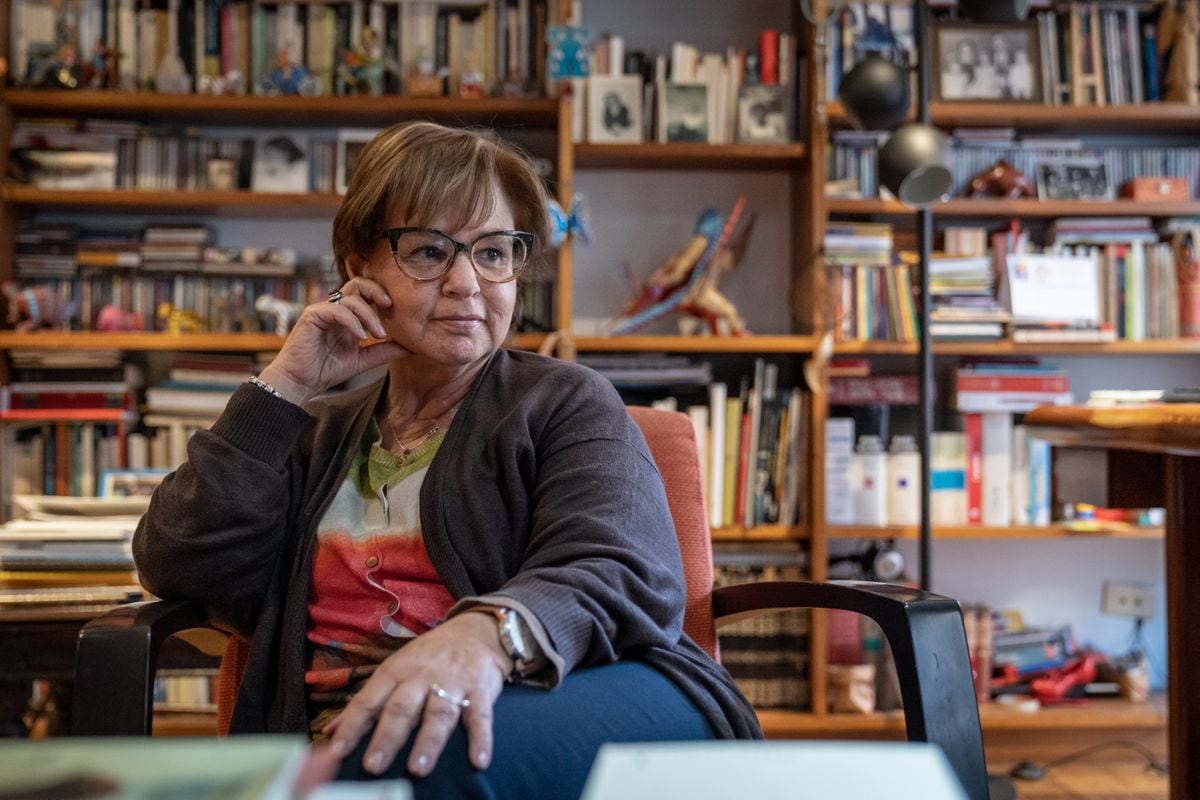Libraries, like wardrobes, speak of their owners.
More than a passion, books can become a hobby like collecting coins or old watches.
Books summon the past, coexist with its voices and resist oblivion.
They have “the ability to abolish time”, as the Spanish writer Irene Vallejo says.
Each library is a universe that revolves around its owner;
It ends up being the expression of its bright and dark sides, of its longing, sadness and joy.
Libraries are not only resonances of the past, but also consonances with the present.
Bibliophiles feel the need to live immersed in books that they don't necessarily read, but do love.
Alejandro Gaviria (Santiago de Chile, 55 years old) is Minister of Education, writer and collector of rare books.
Books for him represent valuable objects, as well as peace of mind, refuge and company.
For 20 years he has collected, in his high-ceilinged apartment, books that are no longer available.
He has an extensive collection of all the first editions of García Márquez's work.
Gaviria has a fascination for the hidden stories behind book dedications.
In his first edition of La Hojarasca, García Márquez wrote on the cover: "For Carlos Alvarado, who keeps my secret."
For years, Gaviria tracked the message and deduced, without having definitive confirmation, that he was the first person to whom the Nobel Prize winner confessed that he was going to marry Mercedes Barcha.
Bibliophiles guard the stories of others.
When someone buys a used copy, they generally don't know who it belonged to and what journey it took to get into their hands.
It is a chain that does not know where it begins or where it will end.
Some time ago Gaviria bought a first edition of
Twelve Pilgrim Tales
with a drop of blood spilled by García Márquez on one of its pages.
The book belonged to a nurse who performed a blood test on the writer, and by mistake she left the drop on the cover.
With it, García Márquez painted a flower and wrote a dedication to it.
When Gaviria found the book, he found a treasure: "It has the DNA of García Márquez."
Some time later, the nurse who had sold it to the second-hand bookstore regretted it.
The bookseller explained the situation to Alejandro who, sadly, returned it.
Alejandro Gaviria, writer and Minister of Education of Colombia, at his home in Bogotá, on February 11, 2023. Chelo Camacho
Gaviria scrutinized, until he found in a virtual antiquarian, the first edition of Gulliver's Travels (1726), by Jonathan Swift.
He paid $80 for a treasure that today would cost between $5,000 and $10,000.
Four months passed and the book did not arrive.
Resigned, he thought he wasn't the only one who had been scammed on the Internet.
Six months later the book arrived with a handwritten letter from a small town in Illinois (United States).
The bookseller told him that he was dying of cancer, that he had a hobby of collecting stamps and asked him for some from Colombia from the beginning of the 20th century.
Alejandro bought them and sent them to him.
He never heard from him again.
Three years later he would also suffer from cancer.
Gaviria has spent years looking for rarities with the help of Álvaro Castillo, one of the largest booksellers in Colombia.
Among the curiosities in his library there is a Diary of Che Guevara in Bolivia signed for Fidel Castro;
books signed by Borges;
the sixth edition of Darwin's On the Origin of Species;
the first edition of a book by Joseph Conrad… Even a manuscript by Aldous Huxley that survived the fire that destroyed his house.
"I like that trip to the past," says Alejandro.
Fascination for the book object
“I always imagined that paradise would be some kind of library”: this Borges phrase encompasses what books represent for many.
In the library of the poet and writer Piedad Bonnett (Amalfi, 72 years old) there is not only knowledge.
She treasures the library that she inherited from her son Daniel, made up mainly of books on art and architecture.
The most famous and celebrated book of Mercy is What has no name, about the suicide of her son.
In every corner of his house there are books.
Biographies, novels, essays, poetry.
He calculates that he may have 6,000 books;
at first glance they seem more.
There are some that he no longer consults but that are relics, like encyclopedias: “The encyclopedia is wonderful.
When it's virtual, you're searching, but when it's on paper, you randomly open any page and start finding things that spark your imagination,” he says.
Piedad Bonnett, Colombian writer, at her home in Bogotá, on February 10, 2023Chelo Camacho
Piedad also buys books for the beauty of their covers and pages, to contemplate them.
“I have a kind of fascination with the book object,” she says.
In the room there are fables by La Fontaine, the pictorial work of Leonardo Da Vinci and Battista Piranesi.
In her books, she collects traces of his friendships with other poets, some already dead, such as José Watanabe and Blanca Varela.
He also has signatures of Vargas Llosa, Raúl Zurita, García Márquez.
He organizes the library by genres and countries.
Books keep the moments and feelings that remain in their readers when they were read.
Piedad usually revisits those who have inspired her and, before sitting down to write, she always reads.
“To kill fear and build up my courage,” she says.
In a special place, she preserves The Treasure of Youth, the children's encyclopedia with which she began as a reader.
One of her jewels is a leather-bound edition of Shakespeare's works from 1734. “At one point in my life I discovered that when I was upset, in pain, or in pain, my head immediately turned to me. study.
More and more in life all I want to do is read and write, and I like reading more than writing,” she says.
Signatures, wine and dedications
Bibliophiles are romantics.
In the house of the writer, journalist and researcher Juan Camilo Rincón (Bogotá, 40 years old) the sweet smell of old books can be breathed.
Almost every wall is covered with cluttered shelves and furniture.
He keeps the most precious ones in zip-lock bags.
In the living room and in the three rooms, including the bedroom, there are books.
On the shelves where other people would keep clothes, he has books.
"I know what I'm saving and it's one more time that I give them life," he explains.
Juan Camilo has found parts of the libraries of the politician Rafael Uribe Uribe and the writers María Mercedes Carranza and Elisa Mújica.
It has around 6,000 books, 3,000 of them signed by their authors and 2,500 first editions.
He has specialized in Ibero-American literature.
He has 400 Borges books and about his work;
350 of and above Cortázar;
100 of and about García Márquez, Pablo Neruda and Octavio Paz.
“Signed books have a small seed, a trace of the writer;
the author touched the book and that makes it wonderful,” he says.
Through dedications, signatures, and letters, Juan Camilo has traced relationships between writers and countries, as he does in his most recent book,
Colombia and Mexico, Between Blood and Word
.
Among his jewels, he preserves a book by Ricardo Palma dedicated to Uribe Uribe and another by León de Greiff signed to the poet Matilde Espinosa, on whose pages the wine the author drank while making some corrections in his handwriting was spilled. .
Juan Camilo Rincón, Colombian journalist and writer, holds one of his books at his home in Bogotá, on February 11, 2023Chelo Camacho
Its collection also includes wonders such as Viento fuerte, by the Guatemalan Nobel Prize winner Miguel Ángel Asturias dedicated to another Nobel Prize winner, the Spanish Camilo José Cela;
and Sombra del paraíso, dedicated by the Spanish Vicente Aleixandre to the Colombian Andrés Holguín;
books that were part of the Holguín, Enrique Grau and Fernando Charry Lara libraries;
and a curious signature book by Isabel Pérez de Ayala, secretary of former President Eduardo Santos, in which she collected signatures, poems and even illustrations of important writers, musicians, politicians or academics.
The greatest pain of a bibliophile is the loss of his books.
Although they no longer fit in the house, Juan Camilo cannot be seen without them.
In fact, he believes that if there was an earthquake, he would rather die there with his cats, his plants and his books.
The last time Piedad Bonnett moved, 20 years ago, he spent six months organizing his books.
Books are living presence
There are collectors who do not recognize themselves as such.
For Alejandra Jaramillo (Bogotá, 51 years old), a writer and professor of creative writing at the National University, books are knowledge and background for her teaching.
“The first time I held a book in my hand, I think it was the most important moment of my life, because I discovered that they could be the perfect company, that no amount of loneliness could end me,” she says.
For Alejandra, books are a living presence.
She collects, above all, contemporary literature by women writers.
She has compiled a compilation of the Latin American literature boom of the 1960s. In her courses she includes writers who are not normally featured as part of the boom, such as Clarice Lispector, Elena Garro, Cristina Peri Rossi and María Luisa Bombal.
“I want the world of women in literature to be present, to be read, and to make a very important form of literary construction,” she explains.
Alejandra Jaramillo, Colombian writer and teacher, at her home in Bogotá on February 11, 2023Chelo Camacho
In his library he has books signed by Albalucía Ángel, Laura Restrepo, Roberto Burgos or Julio Paredes, most of them current writers.
“I'm not compulsive buying books, I buy because I need them,” he says.
Collectors or book lovers are all different from each other.
Alejandro Gaviria, Piedad Bonnett, Alejandra Jaramillo and Juan Camilo Rincón have in common that they safeguard the history of books, they are their temporary custodians.
The books have outlived others and will survive them and the passage of time.
Subscribe here
to the EL PAÍS newsletter on Colombia and receive all the latest information on the country.




/cloudfront-eu-central-1.images.arcpublishing.com/prisa/BY22V52JGRHFNFQGPXLPPDLKUI.jpg)










